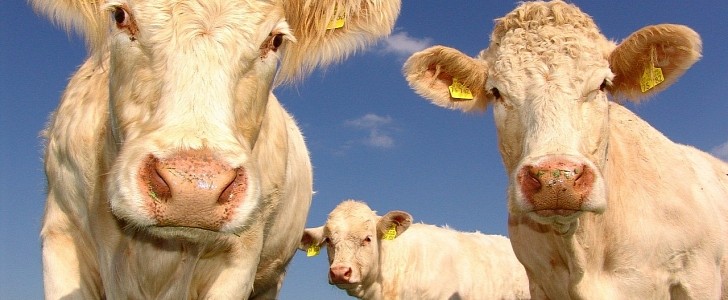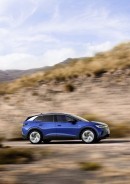If you recently decided to switch to an electric vehicle to cut costs and emissions, here’s Greenpeace to put a damper on your feel-good mood: this doesn’t solve anything, because livestock gasses are higher than car emissions.
A new report from Greenpeace published this week under the headline Farming for Failure (via The Guardian) notes that greenhouse gasses from livestock (cows, pigs and other farm animals) are actually higher than all the emissions from cars and vans in the European Union. In other words, even with all the best efforts on part of the auto industry as a whole, carbon emission targets will not be reached in time if nothing is done to cut down on livestock.
In other words, and over-simplifying to the extreme, even if you do buy an electric vehicle or even switch to another means of transportation, you’re not really making a difference if you’re still eating meat and dairy.
The report isn’t meant to discourage meat consumption or to propose a different lifestyle, but to highlight the importance of this so policymakers in the EU can act in order to reduce greenhouse gasses produced by the industry. The figures speak for themselves: in 2018 (the most recent year for which data is available from the UN Food and Agriculture Organization), cars and vans in Europe released 656 million tons of carbon dioxide. Livestock farms, on the other hand, were responsible for 502 million tons of carbon dioxide on their own – and 704 million tons in total, factoring in indirect greenhouse gas emissions.
Meat consumption rose by 9.5 percent between 2007 and 2018, which led to a 6 percent rise in emissions, the group says. This is the equivalent of putting 8.4 million new, gas-guzzling cars on the roads – except, well, in farts. Should this ascending trend continue, and there are clear indications it will, the EU won’t meet carbon emission targets.
“European leaders have danced around the climate impact of animal farming for too long,” Marco Contiero, agriculture policy director for Greenpeace, says of the findings. “Science is clear, the numbers as well: we can’t avoid the worst of climate breakdown if politicians keep defending the industrial production of meat and dairy. Farm animals won’t stop farting and burping – the only way to cut emissions at the levels needed is to cut their numbers.”
The full report is available as a PDF below.
In other words, and over-simplifying to the extreme, even if you do buy an electric vehicle or even switch to another means of transportation, you’re not really making a difference if you’re still eating meat and dairy.
The report isn’t meant to discourage meat consumption or to propose a different lifestyle, but to highlight the importance of this so policymakers in the EU can act in order to reduce greenhouse gasses produced by the industry. The figures speak for themselves: in 2018 (the most recent year for which data is available from the UN Food and Agriculture Organization), cars and vans in Europe released 656 million tons of carbon dioxide. Livestock farms, on the other hand, were responsible for 502 million tons of carbon dioxide on their own – and 704 million tons in total, factoring in indirect greenhouse gas emissions.
Meat consumption rose by 9.5 percent between 2007 and 2018, which led to a 6 percent rise in emissions, the group says. This is the equivalent of putting 8.4 million new, gas-guzzling cars on the roads – except, well, in farts. Should this ascending trend continue, and there are clear indications it will, the EU won’t meet carbon emission targets.
“European leaders have danced around the climate impact of animal farming for too long,” Marco Contiero, agriculture policy director for Greenpeace, says of the findings. “Science is clear, the numbers as well: we can’t avoid the worst of climate breakdown if politicians keep defending the industrial production of meat and dairy. Farm animals won’t stop farting and burping – the only way to cut emissions at the levels needed is to cut their numbers.”
The full report is available as a PDF below.








































































